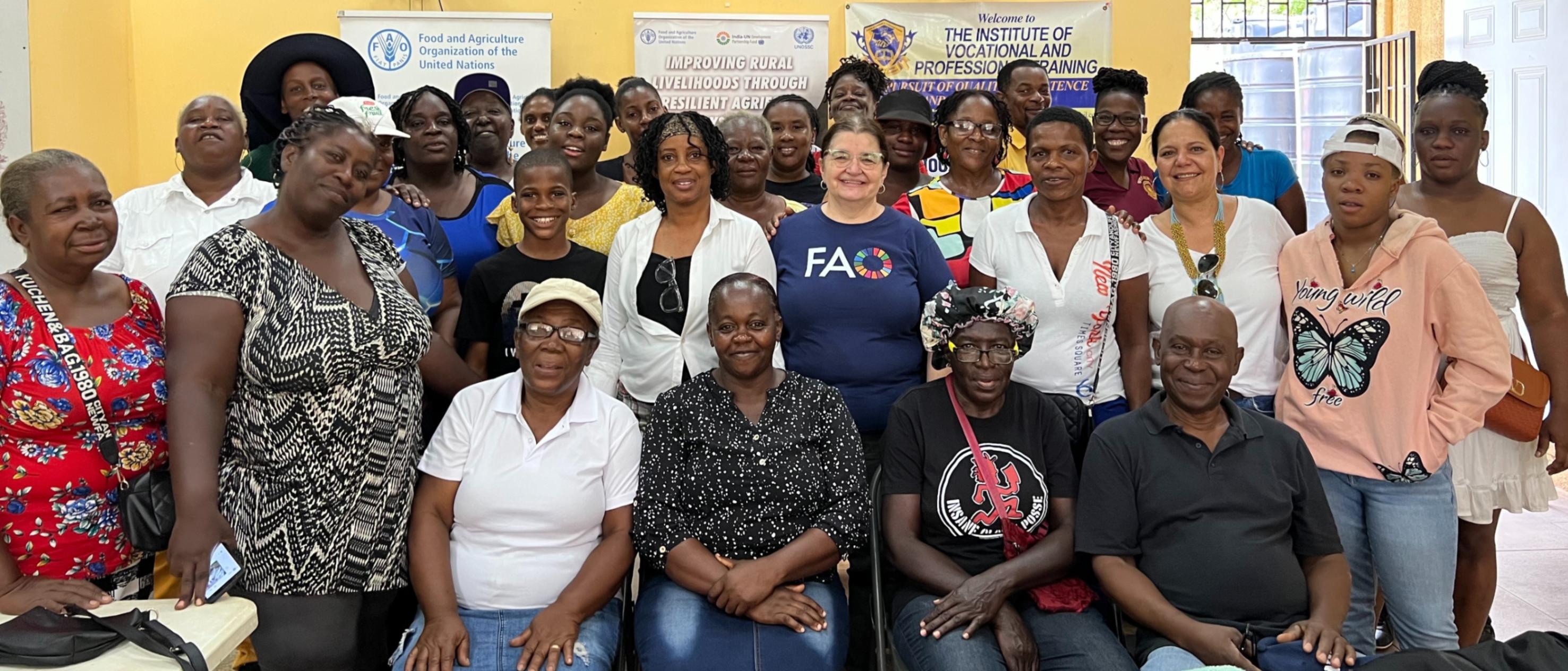Women and Youth in Kitson Town Graduate from FAO Poultry Training
Near 50 farmers participated in a training programme supported by a South-South Cooperation Initiative by the Government of the Republic of India.

©FAO
Nearly 50 poultry farmers predominantly women and youth graduated from a comprehensive training programme in small livestock production under the Improving Rural Livelihoods Through Resilient Agri-food Systems project. A collaboration between the Food and Agriculture Organisation of the United Nations (FAO), the Government of Jamaica (GOJ) and Kitson Town Community Development Committee, the project is funded under a South-South Cooperation Initiative by the Government of the Republic of India – India UN Development Partnership Fund.
Held in Kitson Town, St. Catherine on May 30, the graduation ceremony marked a key milestone in advancing entrepreneurship and sustainable livelihoods in the Kitson Town community. Implemented in partnership with the Spring Village Development Foundation, the training programme focused on practical poultry management and included on-farm training sessions tailored to meet the needs of emerging and current producers.
The training covered areas such as housing design, nutrition, pest and disease management, biosecurity, and regulatory requirements. Beneficiaries also helped to construct model poultry houses for demonstration and replication, offering a practical guide for other farmers in the community.
Women’s Participation in Agrifood Systems
FAO Representative for Jamaica, The Bahamas and Belize, Dr. Ana Touza, delivered the keynote address at the ceremony, emphasizing the significance of the intervention. “You are not only acquiring skills but you are also claiming space in an industry where your voice, your labour, and your leadership are essential,” she said.
Dr. Touza’s remarks also referenced FAO’s recently launched report, The Status of Women in Agrifood Systems: A Regional Approach for Latin America and the Caribbean, which notes that while women now comprise 36% of the agrifood workforce in the region, barriers persist in access to productive resources and decision-making spaces. The report states that Latin America and the Caribbean is the only region in the world where women's participation in agricultural activities has increased over the last two decades. “This initiative responds directly to the call for greater gender equity in rural economies,” Dr. Touza added.
Executive Director of the Spring Village Development Foundation, Mr. Randy Finnikin, commended the graduates and underscored the value of the partnership. “We are incredibly proud of your achievement. You are the reason we do what we do. This project is about improving rural livelihoods, and it is meaningful that FAO recognized the potential of this community and chose Spring Village as a partner.”
Project beneficiary, Shaherah Brown-Lawrence shared her experience and the impact of the training on her operations. “This training has impacted my life in so many ways. [I have learnt] better documentation and budget spending. I actually learned how to calculate the number of birds to a carrier and the number of blocks to start the [poultry] structure. We have been on field trips in different communities exploring and teaching knowledge to others.”
Role of Poultry in Food Security
Animal nutritionist and FAO Consultant supporting the livestock component, Dr. Tanika Dennie, underscored the value of poultry production in food and nutrition security.
“Too often we forget that animal-based protein is critical for brain development particularly in the first 5 years of a child’s development. Aside from aquaculture, poultry is the most efficient of all livestock production systems.
According to Dr. Dennie, the training has equipped beneficiaries with best practices that are already showing strong results. Farmers using open-sided poultry houses have achieved feed-to-meat conversion rates comparable to those using more advanced tunnel-ventilated systems.
She emphasized that the combination of practical and theoretical knowledge provided through the programme is a highly effective approach to livestock production. “By implementing good agricultural practices,” she noted, “you can achieve the same level of performance as birds raised in tunnel-ventilated houses.”
As the project advances, beneficiaries in Kitson Town will receive continued technical support focused on business development, entrepreneurship and infrastructure. This will be delivered through close collaboration with the Jamaica Business Development Corporation, Junior Achievement Jamaica and Agro Investment Corporation. Beyond training, the project will also provide climate-resilient infrastructure and equipment, including improved livestock systems, greenhouses, hydroponic units, small-scale irrigation, and a drying and packaging facility. These investments aim to enhance value-added production and expand opportunities for the community.
